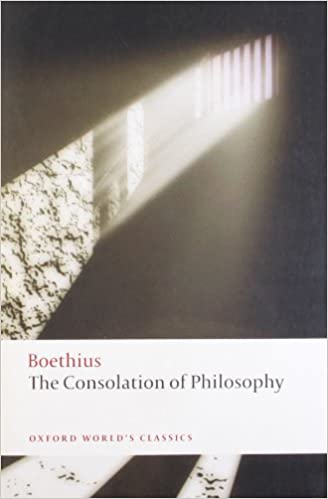The Consolation of Philosophy

Boethius composed De Consolation Philosophiae in the sixth century A.D. while awaiting death by torture, condemned on a charge of plotting against Gothic rule, which he protested as manifestly unjust. Though a Christian, Boethius details the true end of life as the soul's knowledge of God, and consoles himself with the tenets of Greek philosophy, not with Christian precepts.
Written in a form called Meippean Satire that alternates between prose and verse, Boethius' work often consists of a story told by Ovid or Horace to illustrate the philosophy being expounded. The Consolation of Philosophy dominated the intellectual world of the Middle Ages; it inspired writers as diverse Thomas Aquinas, Jean de Meun, and Dante. In England it was rendered into Old English by Alfred the Great, into Middle English by Geoffrey Chaucer, and later Queen Elizabeth I made her own translation. The circumstances of composition, the heroic demeanor of the author, and the Meippean texture of part prose, part verse have been a fascination for students of philosophy, literature, and religion ever since.
As mentioned in:
- Episode #19: The Intersection of Effortlessness and Hard Work (with Dr. Christopher Perrin!)
- Episode #40 – Moms Learn and Grow! (Part II with Cindy Rollins!)
- Episode #47 – Rightly Dividing (with Karen Glass!) by Karen during the Scholé Everyday Segment
- Episode #95: What are the Liberal Arts? (with Dr. Chris Schlect!)
- Episode #121 – Barefoot in the Kitchen with the Ideal Type (with David Hicks!!)
- Episode #124 – Redeeming the 5-Paragraph Essay with Renee Shepard by Mystie during the Scholé Everyday Segment
